I arrogantly recommend…by Tom Bowden is a monthly column of small press and books-in-translation reviews by our friend, bibliophile, and retired pavement inspector Tom Bowden, who tells us, ‘This platform allows me to exponentially increase the number of people reached who have no use for such things.’
Links are provided to our Bookshop.org affiliate page. Bookshop.org is an alternative to Amazon that benefits indie bookstores nationwide. If titles are unavailable, please call, we’ll try to help. Most of Bowden’s reviewed books are stocked at Book Beat. Thank you for your support! Read more arrogantly recommended reviews at:I arrogantly recommend… by Tom Bowden.
 Astounding Secrets of the Devil-Worshippers’ Mystic Love Cult
Astounding Secrets of the Devil-Worshippers’ Mystic Love Cult
William Seabrook
Snuggly Books
During the 1920s, Detroit’s salad days as an American metropolis, magic came to town in the form of British mystic Aleister Crowley. Crowley headed a church he called the Ordo Templi Orientis (OTO) whose credo was “Do what thou wilt,” a libertarian theology that appealed to prominent Detroit Masons who, according to Crowley’s biographer Richard Kaczynski, wanted to establish an OTO order here. As with other things libertarian, when the bill comes due for doing what thou wilt, personal responsibility turns out to be an onus dumped on the hapless rather than taken up by the übermensch. In the case of Crowley, the bill amounted to a highly publicized scandal whose ideas were alleged to have precipitated but were enacted by those who took them seriously.
Not the title of an album by the Acid Mothers Temple, Astounding Secrets was published serially in the second quarter of 1923 as an explanation to Americans of Crowley, who in this book makes trips to the Motor City, including stopovers to the publisher Albert Ryerson, which lead to three divorces for Ryserson from his increasingly young wives. (Wife #3 was 19 when Ryerson was 51. You can Google it.) William Seabrook, who claims to have known Crowley for decades, assures us that his is an authentic account of what Crowley gets up to.
Not surprising for a writer claiming acquaintance with Crowley, the tone of Seabrook’s prose is set to carney barker bombast, littered with hyperbole, redundancy (was he paid less than a penny a word?), titillation, and scandal, in which one’s response the revelations—such as they are—rarely rise above the “meh” (re: i.e., recreational drug use), except for suggestions that numerous women (only one is presented as an actual case) ask Crowley to brand and slice their flesh and a case Crowley admits was wrong to do in which he had a cat slaughtered for a ritual. So, mostly a bit of nasty S&M (between consenting adults) among the smoke and mirrors, of which there are plenty, metaphorically speaking.
What to make of Crowley? He seems to have been separated at birth from his brother-in-spirit, P. T. Barnum. Whereas Barnum made his scams family-friendly, Crowley—perhaps more an introvert—saved his best stuff for jaded members of what passed for American aristocracy. As a result, no one—not Crowley himself, let alone devotees from his flock—knew how seriously to take the spells, rituals, and incantations that just suddenly ended, with nothing happening except a rising sense of creepiness. The power of suggestion, confidently suggested, to those asking what he suggests—the pay was good, apparently, and no publicity was bad publicity. Why a mode of living—do what you want—requires oogie-boogie spiritualism to accompany it is beyond me. Many of the rituals are simply re-enactments of Christian rituals but with different nouns, and in that regards it’s merely reactionary rather than the next step in spiritualism.
Seabrook recounts smoking “hasheesh” with Crowley and a group of well-heeled acolytes. More specifically identified by Seabrook as cannabis indica, it never induces laughter or forgetfulness among the group but produces hallucinations tinged with paranoia (before LSD was discovered) lasting only about two hours, instead of the six to twelve hours induced by such hallucinogens as mushrooms, peyote, or LSD. So, perhaps these “hallucinations” were merely suggestions eagerly taken up to stave off social embarrassment. After all, in the hour leading to the unexpected hallucinations, Seabrook reports, “Crowley repeated the supposedly magical words. As if from a great distance one heard the repeated, booming, ‘Padma oom!’ like some great faraway, muffled, brass band.”
As for the rest of us, we began to be, frankly, a little bored. There we lay, in the dimly lighted, quiet room—and nothing whatever happened.
“Do you feel anything yet?” the Englishman asked the Russian girl.
“No, monsieur,” she responded in French “—unless a slight tingling in my toes, but I think that’s just because my foot’s gone to sleep.” And so we talked, intermittently, rather stupidly, it seemed to me, for some time.
Astounding Secrets makes for a quick, entertaining read, slowed down for me only by frequent eye-rolling in reaction to the ludicrous and salacious prose describing the antics of an erstwhile PTL Club for the well-heeled.
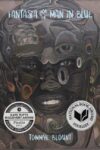 Fantasia for the Man in Blue
Fantasia for the Man in Blue
Tommye Blount
Four Way Books
Detroit-born and -bred poet Tommye Blount made his debut with Fantasia for the Man in Blue in 2020, a collection that is both very good and a National Book Award Finalist. That’s a debut. In it, Blount explores the fraught psycho-sexual terrain of a Black homosexual who enjoys subordinate positions in rough sex with white policeman, or white men in general. The sex fuses orgasmic volatility to 500 years of racial dynamics and intense, self-abasing rage in the service of a bottom’s gratification.
From “Blood Harmony”:
. . . our bodies, together,
are the only capable instrument;
a fine instrument of brutality—
a double-minded man of muscled
rage, reluctant tenderness. We dance . . .
From part VI of “Fable of the Beast”:
No, it is not violence
if I ask for touch
as purposeful as
the softest caress. If not
tenderness, then
let me wear his
bruises
and not be ashamed to heal.
 Rouge Street
Rouge Street
Shuang Xuetao / Jeremy Tiang
Metropolitan Books
Over the last decade, chaotic reality had so numbed his brain that he no longer felt much of anything, and he wasn’t inclined to make any major changes that might send his life careening down a perilous road to the mere possibility of hope. —From the novella “The Aeronaut”
Shuang Xuetao’s Rouge Street collects three novellas that take place in China’s Northeast industrial area, an area that had been in decline for decades but which was revived and its factories updated during the Cultural Revolution (1966-1976), when millions of China’s citizens were “reassigned” or “sent down” to the area to work in China’s inadequate factories as punishment for “bourgeois” thoughts and actions. The rounded-up undesirables included people with college degrees, training, or skills, as well as petty criminals. After the Cultural Revolution, China still needed its factories, and many people stayed after their period of “re-education” ended. Thus, the neighborhoods in which these stories take place are mixtures of people from many backgrounds, from intellectual to criminal, whose thoughts and actions continue to be haunted by the Cultural Revolution.
For instance, in the first story, “The Aeronaut,” the narrator Xuguang thinks over why he has no interest in attending college even though, now that the Cultural Revolution is over and universities are reopening after ten years shut: “if he became a college student, that would make him some kind of professional egghead, and to what end?”
Look at the ten years that had just gone by, and project them forward two decades—would these college students enjoy the fruits of their labors? He’d witnessed a classmate slitting a teacher’s nose, and if he’d wanted, he could have grabbed the knife and slashed that teacher’s cheek as well. They said A one day and B the next, and now the university entrance exams were back, but who could say that they wouldn’t turn from B back to A again? All that studying, only to end up as a stinking ninth-rate intellectual?
Into this hopeless world Xuguang is sent to find his uncle, the one who had first dreamed of designing jet packs for people to travel with, toward which key family members had invested. Even though his dream didn’t come true—an idea unencumbered by any knowledge of physics or design—the family still admires his imagination and ambition. Otherwise, uncle is a homeless drunk.
But compare the desultory life of his Xuguang’s uncle to his mother’s traditional life with his father:
After the factory went bankrupt and the two of them had to fend for themselves, her spirits grew a little heavier. When their home was demolished in the government’s urban clearances, and they had to move to a shantytown on the outskirts of the city, her spirits grew heavier still. They were given a new apartment in compensation, but it never got any sunlight, no one ever cleaned the shared corridors, and the young renters upstairs were professional thugs. Then my father died, a blow that completed Ma’s descent into dour middle age.
As it comes to pass, the uncle has one more trick up his sleeve, this one already assembled and ready to go.
“Bright Hall” concerns the inhabitants of a building on a winding road called Yanfen Street. In one of its incarnations, it was used during the Cultural Revolution for interrogations by Red Guards. The main action of the story takes place some 10 or 15 years afterward, and involves a character who obtains a meticulously detailed map of Yanfen Street from Liao Chenghu, an acquaintance of the narrator’s but 30 years his senior, whose middle fingers were chopped off by Red Guards at Bright Hall because he created sculptures alleged to be reactionary.
As minutely detailed in the map, Yanfen Street’s winding length forms a geographically enormous coil with a lake at its center, a decrepit factory nearby, and a cemetery behind it. The street’s coil is like the circles of Dante’s Inferno, but the characters of “Bright Hall” are unvoluntary inhabitants of a hell perpetuated by government actions designed to undermine civic harmony and encourage the betrayal of friends and family in the name of ideological purity, leading to multi-generational duplicities among family members and friends. Unlike Dante’s Inferno, however, few people on Yanfen Street live there because they “deserve” it, and few seem to understand what they’re caught up in.
“Moses on the Plain” is told via an interconnected set of first-person narratives that explain a community and solve a murder over a 12-year period. The time is Post-Cultural Revolution but before China enters the world market and its manufacturing section goes into overdrive. Threatened during this time (and continuing today) are old apartment complexes that the government razes while dispersing the former tenants to different cities, their bonds severed, including agreed-upon gestures and gifts that settle arguments and forge modes of mutual reciprocation and responsibility.
Downbeat but realistic, Shuang’s characters are compelling even when misguided, and Jeremy Tiang’s translation is rendered smoothly in idiomatic English.
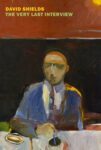 The Very Last Interview
The Very Last Interview
David Shields
NYRB
A funny and depressing “memoir” of a sort based not on Shields’s disquisitions about his life but on the interviewers’ presumptions about Shields’s life. For The Very Last Interview, Shields extracted 2,000+ questions from 40 years of interviews with him, which he then organized into categories. The results are appalling for what they reveal about the character of the questioners and their seeming refusal to accept Shields’s own explanations for, say, his motivations, rather than those they came to the interview with. What the interviews presume to tell us is that Shields is a depressive Jew whose career has been on the skids for the past 20 years or so and whose life, at every point, has been haunted and debilitated by stuttering.
The Very Last Interview is an extended exercise in bad rhetoric and bad faith: Most questions have only “yes” or “no” as their answer, many of which also serve as leading questions, since the “correct” answer is already embedded in the questions themselves. At any point the interviewers receive answers contrary to their expectations, they are more interested in discrediting Shields’s opinion than they are in revising their own. Apart from their unwarranted assumptions, the questions also vary from the impertinent to invasive to insulting, and all are utterly asinine and inane.
If your books aren’t really seeing anymore—which more or less means that you no longer have a readership—then why, exactly, are you still writing them
On Shields’s athletic adolescence and its sudden end:
Your broken leg—kind of a convenient excuse, don’t you think?
It’s not as if you were destined to be Seabiscuit and then, after the broken leg, you suddenly became Stephen Hawking, is it?
There’s that hoary cliché about how sports teach people focus and hard work and discipline; you’re not going there, are you?
On the quality of Shields’s teaching:
Ever taught a truly great course?
How about a single really excellent class?
How about a genuinely meaningful one-on-one conference with a student?
Perhaps you view teaching as nothing more than a day job?
A sinecure?
What’s your salary?
Seriously?
Seems to me a poor expenditure of taxpayers’ dollars, since what do the residents of the state actually get as a result?
On the trajectory of Shields’s career:
But you’re too old to change your life in any substantive way, wouldn’t you agree?
So—not to put too fine a point on it—has it been as wasted life?
Who wouldn’t be a depressive misanthrope dealing with such idiots? Back in 1960s, the cultural critic Dwight McDonald coined the phrase “phosphorescent quotation,” which for him signaled a new turn in American humor, a turn based not on traditional jokes or exaggeration but on straight-faced quotation of statements that are prima facie absurd to begin with—such as Eisenhower’s tautology, “Things are more like today than they’ve ever been before.” In that regard, The Very Last Interview emphatically glows.
 Black-White-Red: Grotesques
Black-White-Red: Grotesques
Mynona / W. C. Bamberg
Wakefield Press
Originally published in 1916, this is the fourth book of grotesques by Mynona, née Salomo Friedlaender, to be brought back by Wakefield Press, translating from German to English stories quite strange—simultaneously funny and eerie, overwrought and earnest—and written by a man who could claim Martin Buber, Walter Benjamin, and Karl Kraus among his fans. (“Mynona” is the German for “anonymous” spelled backward.) The Unruly Bridal Bed, an earlier collection by Mynona, can read like Poe and Lovecraft meet Laurel and Hardy. The Creator and My Papa and the Maid of Orleans are the two other works available.
Five of the six “grotesques” comprising Black-White-Red are miniature parodies (the book is only 51 pages long) of philosophy and science, with one beyond-the-grave tale. The effect is one that few authors today explicitly set out to create in their readers’ experience: that the stories be droll. Mynona’s day job was as the philosopher Salomo Friedlaender, and appropriately enough, the first grotesque in this collection is a philosophical argument—one on the superiority of Goethe’s color theory to Newton’s (all is explained and examples are provided). The second grotesque, “Goethe Speaks into the Phonograph: A Love Story,” is closer to today’s sense of “grotesque” as “gross,” as it involves exhuming Goethe’s corpse with the aim to both reproduce his voice and, through an ingenious device (cf., not convincingly explained), amplify his still-echoing voice at home and record his timeless words. Jealousy is involved. . . You get the idea.
Charming, inventive, and indeed droll.
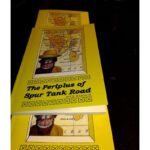 The Periplus of Spur Tank Road
The Periplus of Spur Tank Road
Rick Harsch
corona/samizdat
As a periplus, the book falls short because the author gets no further than describing one spot along Spur Tank Road—well, less a description of a spot—i.e., the bar at the Hotel Ganesh—than a recording of a conversation the narrator has with a bonnet macaque monkey that has taught itself speech and the ability to read. They meet as strangers. But the macaque, named Pagen, is affable enough to introduce himself. Once the narrator, Rick, confirms the macaque’s abilities, he suddenly realizes that “now people are looking at me, looking at me talking to a monkey.” To which Pagan deadpans, “I don’t think they can see me.”
And yet, there he is, keeping up his side of the wide-ranging conversation, which eventually settles around Vasco da Gama and series of atrocities he initiated against India’s citizens, from which a consensus between the two forms that humans are no damn good. In addition to that agreement are good amounts of puns and other word play, anecdotes, and observations, making for good-natured banter and rapier repartee.
Here is one of Pagan’s anecdotes:
“My tail got set on fire once. Completely disaster. We were down by that river you call the Cauvery, a narrow, generally shallow expanse with an island in the middle. Lightning struck a tree I was in growing out from near the bank, a fire sprouted, I tried to slap it out with my tail, but it was dry season, so my tuft caught and I feared the hot ass, panicked, jumped, missed the river, and in said panic and accompanying hoppery I set fire to all the trees on the island, one female burned to death. She was a favorite of the older males. Had they been humans I would have been in trouble. As it was, I was nursed back to health, had irregular hair for a long time, other than that the only lasting effect was one less lovely bonnet macaque in the jungle.”
It’s kind of thing you’ll like if you like this kind of thing, as I do.
 Keywords for Capitalism: Power, Society, Politics
Keywords for Capitalism: Power, Society, Politics
John Patrick Leary
Haymarket Books
Keywords for Capitalism follows Leary’s previous Keywords: The New Language of Capitalism and, like its predecessor, approaches the concepts under consideration with amused (and amusing) skepticism toward their purported meanings and uses, given that purported intent rarely matches actual outcome.
For instance, Leary sees the topic of “partisanship” often negatively characterized as a form of “tribalism,” and tribes are what “backwards” nations are populated by. “’[T]ribe’ is often synonymous with ‘ethnicity,’ yet . . . also marks linguistic and geographic disparities. But the word ‘nation’ does the same thing—so what’s the difference? One answer is that calling someone else’s nation a ‘tribe’ is a prerogative of conquest. As the Kenyan novelist Ngugi wa Thiong’o has summed it up: thirty million Yorubas are a tribe, but four million Danes are a nation.”
The tone throughout is ironic, presumably in response to the earnest contradictions embedded in terms like “policy” and “pundit.” Hypocrisies and contradictions (conscious and un-), historical shifts in meaning—the events that make wry skepticism a rational response to everything political, especially once contentious terms become part of administrative vocabulary. For instance, “’Inclusion’ is usually defined as the way you get ‘diversity,’ the concept to which it’s habitually bound.”
On the one hand, it is diversity’s whimsical, unmeasurable sibling, a subjective matter of employees’ and students’ feelings and sense of belonging. And on the other, inclusion is a list of human-resources policy proposals, none of which ever seem to involve a labor union, free tuition, or a robust grievance procedure.
It almost makes you think that the point of ‘inclusion’ initiatives spearheaded by managers is that they never have to end. Why, after all, would one expect them to ensure accountability for themselves? Here, the contrast with an older synonym, ‘integration,’ is instructive. Integration, as a word and (at least) as an ideal, is opposed by ‘segregation’; inclusion, by the much less precise concept of ‘exclusion.’. . . A more ‘inclusive’ institution only needs to become a better and more effective version of itself. It’s something you should want to be a bigger part of.
Leary ends his exegesis of “inclusion” with an example from the CIA boasting of its inclusion policies for women, where the organization notes that one of its female agents
found ‘resilience’ in a childhood spent in a war zone, where she handled weapons and drove armored trucks before she turned twelve. The only problem with this story, though, is that her school of hard knocks was 1970s Rhodesia. . . When ‘inclusion’ can seem to celebrate the last ruthless embers of white colonialism in southern Africa, it’s outlived any usefulness it had.
Even positive terms like “ally” and “allyship” are shown to be inherently weak and ineffective in terms of describing actions that can reduce disenfranchisement and bring about greater participation in democratic processes.
Allyship is best compared with ‘solidarity,’ our best word for the practice of making and nurturing allegiances based on principle and common interest. Solidarity, though, is a thing that you do—and you can only do it on behalf of another. An ‘ally,’ most of the time, is a thing you are, a feature of an individual person’s character.
“As such, it is too easy to do it mostly for yourself,” in the form of, say, virtue-signaling to your friends and family by clicking a “like” button on a Facebook post.
Keywords for Capitalism is often surprising and always interesting, thoughtful, and insightful.
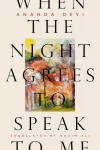 When the Night Agrees to Speak to Me
When the Night Agrees to Speak to Me
Ananda Devi / Kazim Ali
Deep Vellum
Of Indian origin but coming from the tiny island of Mauritius in the Indian Ocean, Ananda Devi is a Francophone writer whose poems and prose poems represented here focus on the immigrant life and being a woman—and all the uncertainties, fears, hopes, abuses that go with them. In the second poem of her 30-poem sequence “When the Night Agrees to Speak to Me,” she addresses the vengeful governments millions are trying to flee but are often forced to return to by other countries:
I don’t know you
Am unaware of your name
Your face unfamiliar
Scarred by its rage
When you tear up my page
You will know who I was
A wound, an upheaval,
A scrap from a dream
You, the master of our fate
Whose name I do not know
From where comes all this anger
This unforgiving fury?
I fled fast as I could
But you brought me back
Dragging me by the hair
Like the last of the damned.
In direct, concrete language she thinks of the young men who choose “the deceptive casual power of a bullet” as a mode of life, and with it
the killing blow you do not see coming but from your exploded mouth hangs the mud of your dreams and with this in your hands you will know nothing of the others but their fear you will bend by your rage but no other body will have ever offered you love
The interview with Devi at the book’s end and essay of appraisal provide further insight into her prose and poetry and encourage curious readers to seek out more of her outstanding work. Kazim Ali’s translation is excellent, succeeding in creating a unique but natural-sounding voice in English.
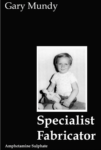 Specialist Fabricator
Specialist Fabricator
Gary Mundy
Amphetamine Sulphate
“Gary Mundy is the founding member of Ramleh, and ran the legendary label Broken Flag,” says the blurb on the Amphetamine Sulphate website, none of the proper nouns in it I had heard of before reading this 40-page book, but which, as a fan of Merzbow, I can now say, OK, I can see all of this happening—whether or not it’s literally or fictionally true. The po-mo version of “Is it live or is it Memorex?” is irrelevant if the story is both well-told and true to life (and it is), if not the life of Mr Mundy in particular.
Specialist Fabricator is, perhaps, Mundy’s autobiographical musing about his beloved father’s death; his battles with profound anxiety and, as a result, drugs and alcohol; and his fears of having betrayed two peers to a bad fate early in life and making his wife’s a hell by doing such things as attempting suicide in front of her. The narrative is unadorned simplicity, seamlessly weaving together strands of the story occurring years and decades apart from each other. The mad compulsion to suicide forms the climax of the book, which put me in mind of Simon Critchley’s Memory Theatre and Notes on Suicide, which also cover emotionally intense breakdowns with sympathy and insight.


thanks for the book reviews!
Thanks for reading!